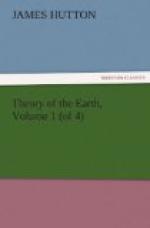We have, first, Burnet’s Theory of the Earth. This surely cannot be considered in any other light than as a dream, formed upon the poetic fiction of a golden age, and that of iron which had succeeded it; at the same time, there are certain appearances in the earth which would, in a partial view of things, seem to justify that imagination. In Telliamed, again, we have a very ingenious theory, with regard to the production of the earth above the surface of the sea, and of the origin of those land animals which now inhabit that earth. This is a theory which has something in it like a regular system, such as we might expect to find in nature; but, it is only a physical romance, and cannot be considered in a serious view, although apparently better founded than most of that which has been wrote upon the subject.
We have then a theory of a very different kind; this is that of the Count de Buffon. Here is a theory, not founded on any regular system, but upon an irregularity of nature, or an accident supposed to have happened to the sun. But, are we to consider as a theory of the earth, an accident by which a planetary body had been made to increase the number of these in the solar system? The circumvolution of a planetary body (allowing it to have happened in that manner) cannot form the system of a world, such as our earth exhibits; and, in forming a theory of the earth, it is required to see the aptitude of every part of this complicated machine to fulfil the purpose of its intention, and not to suppose the wise system of this world to have arisen from, the cooling of a lump of melted matter which had belonged to another body. When we consider the power and wisdom that must have been exerted in the contriving, creating, and maintaining this living world which sustains such a variety of plants and animals, the revolution of a mass of dead matter according to the laws of projectiles, although in perfect wisdom, is but like a unite among an infinite series of ascending numbers.
After the theory of that eloquent writer, founded on a mere accident, or rather the error of a comet which produced the beautiful system of this world, M. de Luc, in his Theory of the earth, has given us the history of a disaster which befell this well contrived world;—a disaster which caused the general deluge, and which, without a miracle, must have undone a system of living beings that are so well adapted to the present state of things. But, surely, general deluges form no part of the theory of the earth; for, the purpose of this earth is evidently to maintain vegetable and animal life, and not to destroy them.
Besides these imaginary great operations in the natural history of this earth, we have also certain suppositions of geologists and mineralists with regard to the effect of water, for explaining to us the consolidation of the loose materials of which the strata of the earth had been composed, and also for producing every other appearance, or any which shall happen to occur in the examination of the earth, and require to be explained. That this is no exaggerated representation, and that this is all we have as a theory, in the suppositions of those geologists, will appear from the following state of the case.




